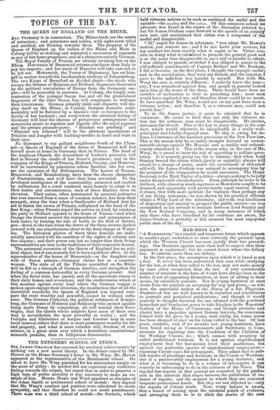THE NETHERBY SCHOOL OF ETHICS.
Sin JAMES GRAHAM has crowned his sessional achievements by striking out a new moral theory. In the debate raised by Mr. Hawes on the Home Secretary's letter to Mr. Wray, Mr. Hawes appeared as the representative of the Benthamite school. He asked to have Mr. Wray punished for his misconduct simply on the score of utility : he neither felt nor expressed any vindictive feeling towards the culprit, but urged that in order to preserve a high tone of public morality it was necessary to make an ex- ample of him. Messrs. Hume and Ward appeared as disciples of the Adam Smith or sentimental school of morals : they argued that Mr. Wray's conduct and position were calculated to excite almathy, and that therefore be could not merit punishment. arse was a third school of morals—the Socratic, which held virtuous actions to be such as combined the useful and the amiable—the wyczov and the /calm. Of this composite school no advocate was heard in the course of the discussion referred to ; but Sir James Graham came forward as the apostle of an entirely new sect, and maintained that virtue was a compound of the useful and disagreeable.
"If," urged Sir James in substance, "you adopt Mr. Hawes's motion, you censure me ; and I do not merit your censure, for my conduct has been exactly what it ought to be. Virtue con- sists in doing what is calculated to promote the general good and is at the same time disagreeable to one's self or hateful to others. I was obliged to punish, or rather I was obliged to assent to the self-inflicted punishments of Captain Boldero and Mr. Bonham. I did so because, in the first place, I thought the example useful; and in the second place, they were my friends, and the sanction I gave to the infliction was painful to myself. But with Mr. Wray the case is entirely different : I scarcely knew the man— nay, I was prejudiced against him, and people in general looked upon him as the worst of the three. There would have been no sacrifice of inclination to duty in punishing him ; most men would have applauded me, and therefore there could be no merit. To have punished Mr. Wray, would not on my part have been a virtuous action ; and therefore I, as a virtuous man, could not punish him." To do Sir James justice, it must be admitted that he is consistent. He seems to hold that not only the virtuous ac- tion but the virtuous man must be disagreeable. He invites, canvasses for This is the key to many things in his con- duct, which would otherwise be inexplicable in a really well- principled and kindly-disposed man. To this is owing his de- fence a l'outrance of the harshest provisions of the New Poor-law. This is the reason why he so rashly brought forward an unwar- rantable charge against Mr. Mazzini and so tardily and unhand- somely abandoned it. This is the reason why, in the case of Mr. Wray, he is proud to incur the risk of appearing to palliate pecu- lation. It is scarcely going too far to surmise, that when Lord Stanley braved the odium which (justly or unjustly) always will attach to a change of party, under the excitement of thwarted self-will, Sir James Graham was seduced to accompany him by the prospect of the vituperation he would encounter. The Home Secretary is the Mark Tapley of politics—always seeking to bejolly under disagreeable circumstances. From principle he seeks to be disliked, with almost as much eagerness as Mawworm sought to be despised, and apparently with pretty nearly equal success. Hence it comes, that with more aptitude for business than perhaps any of our Jiving statesmen—as was shown by his practical reforms whilst a Whig Lord of the Admiralty, and with real kindliness of disposition and anxiety to promote the public service—as was exemplified in his attempt to mediate between Lord Stanley and the New Zealand Company, and in many instances of which only those who have benefited by his exertions are aware, Sir James Graham is probably at this moment the most unpopular public man of the day.


























 Previous page
Previous page